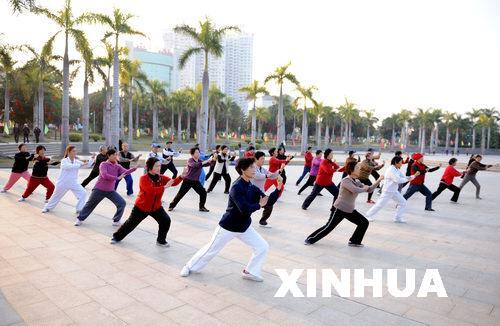Taichi is often considered to be a quintessential symbol of China. Practised both for training and health benefits, it is still widely undertaken by many Chinese people today. Our reporter Stanley Lee joined some Taichi Enthusiasts this time to follow their pursuit of physical well being and inner peace.
Here in the Beixiaohe park in Northern Beijing elderly residents begin yet another day of practise. Taichi brings about a state of mental calm and clarity by focusing the mind solely on the subtle movements of the form. Participants here range in age from 58-78; some only started a few months ago while others have been in the group for 10 years.
"Intense physical activity is not suitable for people our age. Taichi is just right. It really makes me feel more peaceful and flexible," Taichi enthusiast Zhang Qinghua said.
"I’ve been practising Taichi for 5 years, it has really loosened my muscles. I think the body and the mind are connected, so I’ve also gained peace of mind. I think Taichi is for everybody who feels stressed in our modern society," Taichi enthusiast Li Hua said.
Taichi is not just for the elderly, at this Taichi class here, young people like me are also exploring the peace it offers.
The Dao Shengtang Taichi centre teaches intermediate learners. For them it’s never a walk in the park.
 |
|
Taichi is often considered to be a quintessential symbol of China. Practised both for training and health benefits, it is still widely undertaken by many Chinese people today.
|
Owner Chen Daoyong opened the center 4 years ago. His style of Taichi can trace its roots back some 500 years. He has a perspective on the art that’s been often silently overlooked.
Taichi is actually a form of martial arts known for its internal power; it does not resist an incoming force directly but meets it with softness and retains physical contact until an incoming force of attack exhausts itself, making the attacker vulnerable to a counter-strike.
But Chen is treading a fine line and is therefore reaching out to people that want to do Taichi for other beneficial reasons.
"The good thing about a Taichi center is it provides an environment for people to focus and settle down to practise. The center is decorated with Chinese cultural elements, as you can see here, and it also isn’t reliant on the weather, like practising in the park," Taichi master Chen Daoyong said.
Taichi centres across China are aiming to replicate the success of Tae Kwon Do and yoga to become a staple diet for city dwellers who love exercise. With its profound philosophy and exceptional athletic benefits, Chen sees no reason why Taichi can’t succeed.
We recommend:
